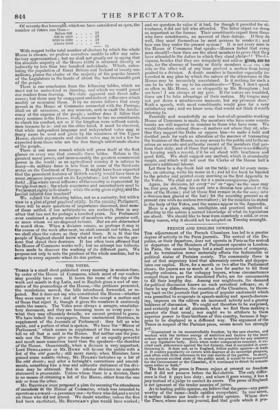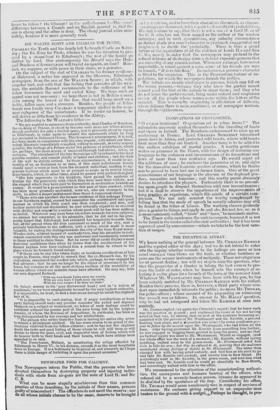FRENCH AND ENGLISH NEWSPAPERS.
THE adjournment of the French Chambers has led to a greater degree of activity in the Paris journals. The arrival of the De- puties, or their departure, does not operate in Paris as the arrival or depart. ure of the Members of Parliament operates in London In Pans, the session brings but a small accession of company, and its termination never materially affects the fashionable or political status of Parisian society. The community there is not of that migratory kind that alternately crowds and depopu- lates our capital. Here, for a month or two after the Parliament closes, the papers are as much at a loss for matter to fill their lengthy columns, as the unhappy buyers, whose circumstances compel them to pace the abandoned Parks, are for amusements to fill their lengthy day. Among our neighbours, the demand for political discussion knows no such periodical refluxes; or, if there be any difference, the cessation of the Chambers, by throw- ing back on the journals that portion of popular excitement which was permitted to evaporate in speech-making and speech-discuss- ing, imposes on the editors an increased activity and a greater boldness of discussion. We ought not therefore to be surprised, and certainly not at all alarmed, when we find them making a greater stir than usual ; nor ought we to attribute to them superior power to their brethren of this country, because it hap- pens to be displayed in a different way. The argument of the Times in respect of the Parisian press, seems much too strongly put. " Guaranteed in its uncontrollable freedom, by the new charter, and worked with the restless energy of ambition and faction by the' most ardent spirits of the country, it must be too powerful for any ministry or any legislatiVe body. Even when under comparative restraint, it ex- cited such abhorrence against the last dynasty, that it succeeded in over- throwing it. It does not, as in England, follow public opinion—it leads it. It confers popularity or covers with disgrace at its sovereign pleasure, and often with little reference to the real merits of the parties. In short, in the present excited state of the public mind, it would be too powerful for the Government or the Chamber, if it continued to direct its assaults upon either or both." The fact.is, the press in Franee enjoys at present no freedom that it did not possess before the Revolution. The only differ- ence is that it pays less duty ; and where it goes wrong, it has a jury instead of a judge to correct its errors. The press of England. is not ignorant of the tender mercies of juries. . As to leading public opinion, we believe that the.press—any press.: worthy of the naine=leads opiitori eVerywhefg One sense,. it neither follows nor leads—it is public opinion. Where does. the Times, where does any journal, find that guide which it pro-
fesses to follow ? On 'Change ? in the coffeehouses, grand-: difference between a French and an English journal is, that the one is cheap and the other is dear. The cheap journal rules more widely, because it is more generally read.



























 Previous page
Previous page